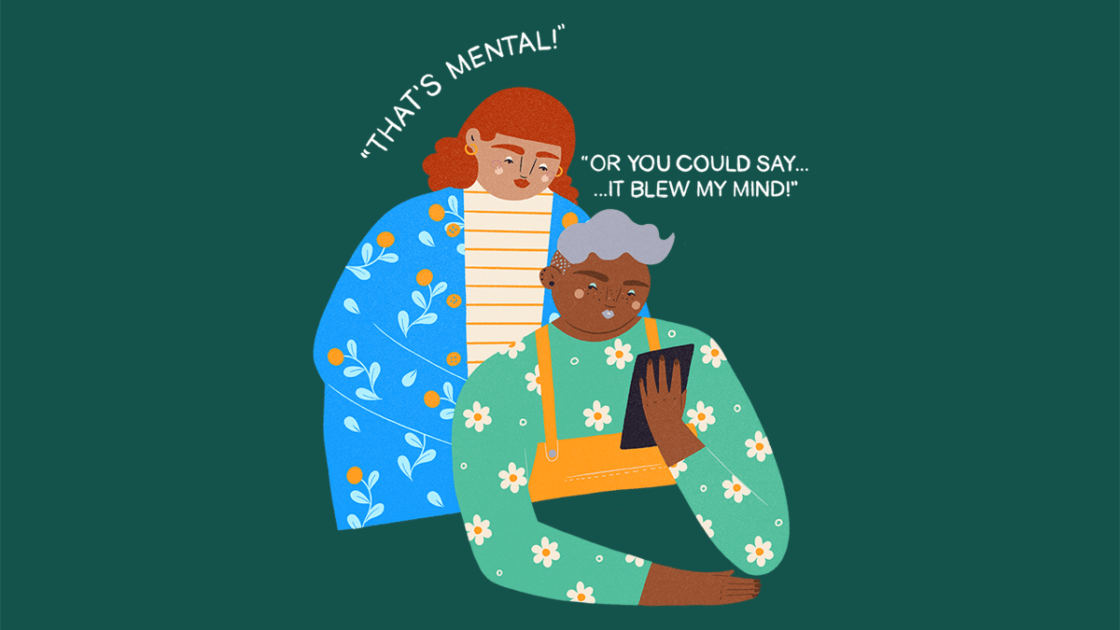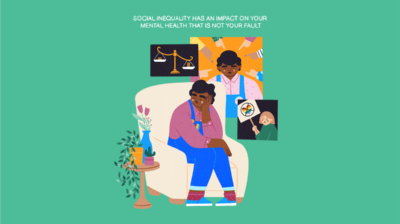Why mental health language matters
The words we use when speaking about mental health can have a huge impact

The words we use when talking about mental health can have a significant impact on the people we speak to. The language we use can influence how someone feels about themselves, their decisions to seek help, and how they treat others with mental health challenges. Our words can either reinforce negative stereotypes or help break them down.
Why mental health language matters
At times, we might not realise that a mental health-related term we use can be stigmatising to other people. This can happen because we’ve heard it often and haven’t thought about what it implies or how it makes others feel. We might hear these terms from people around us or have grown up using them without questioning them. However, language evolves, and words that were once acceptable can become outdated or take on new meanings over time.
Changing how we talk about mental health
It’s easy to accidentally misuse a word, and it can take time to adjust to using different language than you’re used to. With practice, new phrases will become second nature, and you’ll use them without even thinking about it. Changing the way you talk about mental health can make a big difference to those around you and can help shift the broader culture around mental health, even if you don’t realise it.
People with mental health difficulties sometimes choose to keep their experiences to themselves. This may be partly because they don’t want others to know, or fear being judged. Using sensitive language around mental health shows basic respect and signals that there’s nothing wrong or unusual about facing mental health difficulties. It also shows that you don’t define someone by their experiences. The way you talk about mental health can influence how your friends and family think and speak about it. Choosing to use mental health language that does not reinforce stigma may even encourage others to open up about their mental health. People are more likely to do so if they feel they are in a safe space, where their experiences will be respected and validated.
Using person-centred mental health language
Person-centred language recognises that a person’s mental health condition is just one aspect of who they are. This means referring to ‘a person who experiences addiction’ or a ‘person who has experienced addiction’ rather than using the term ‘addict’. Labelling someone by an experience of addiction or mental health condition can dehumanise a person, making it easier to stigmatise them. When using person-centred language, you show that you do not judge or define someone by their experience of mental ill-health. Instead, you are signal that you recognise the complexity of human lives, along with the social, economic, and cultural contexts in which we live.
Examples of person-centred language:
AVOID SAY INSTEAD
They are… an alcoholic – …a person experiencing (living with) an alcohol addiction
They are… depressed – …a person who has depression/a person currently experiencing (living with) depression
They are… psychotic – …a person with lived experience of psychosis/a person who is experiencing (living with) psychosis
Often, we may hear people use mental health terms in casual conversations or use terms incorrectly. Common phrases such as saying “that’s mad”, “that’s mental”, “they’re psycho”, “that’s crazy” or “someone committed suicide” can be used without people realising how such phrases continue to stigmatise people’s experiences of mental illness. Similarly, some people describe themselves as “OCD” because they like to have things clean. Others might label themselves as “bipolar” when experiencing a mood swing. Doing so can minimise the experiences of people living with these conditions. At first, it can be hard to change the language you use. You may not even realise that you say these phrases regularly. Learning phrases that you can replace old ones with can help you change your own language moving forward.
Alternative phrases to use:
- That’s mental – That’s unbelievable/ That’s shocking
- That’s crazy – I can’t believe that/ that’s wild
- That’s mad – That’s ridiculous
- Someone committed suicide – Someone died by suicide/Someone took their own life
Read more about the language to use when talking about suicide.
Respecting experiences of mental health conditions
How people who live with mental health conditions choose to refer to their own experiences is completely up to them. People should be able to refer to their experience of mental ill-health in a way that they feel comfortable with. Some might choose to refer to themselves as ‘an addict’ for example. It is not appropriate for someone who does not experience mental ill-health to correct someone when speaking about their own experiences. But we can use sensitive, inclusive language when speaking about someone’s experience that is not our own.
Feeling overwhelmed and want to talk to someone?
- Get anonymous support 24/7 with our text message support service
- Connect with a trained volunteer who will listen to you, and help you to move forward feeling better
- Whatsapp us now or free-text SPUNOUT to 50808 to begin.
- Find out more about our text message support service
If you are a customer of the 48 or An Post network or cannot get through using the ‘50808’ short code please text HELLO to 086 1800 280 (standard message rates may apply). Some smaller networks do not support short codes like ‘50808’.






